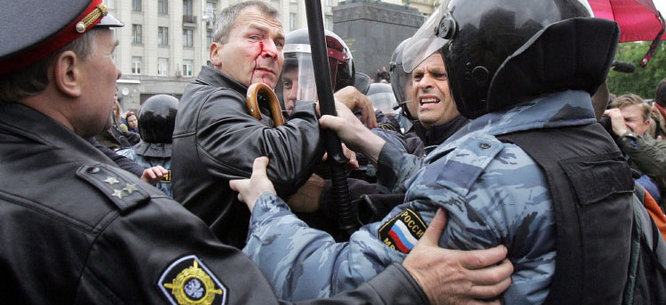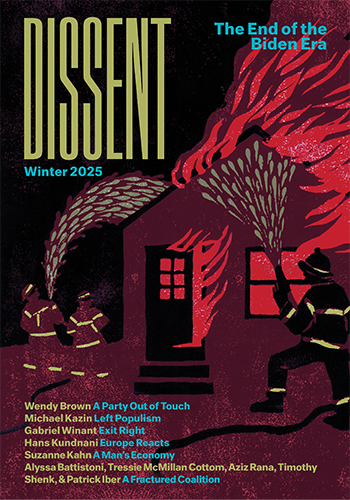Unchecked Aggression Against Russia’s LGBT Community
Unchecked Aggression Against Russia’s LGBT Community
Violence against gays and lesbians in Russia has never been as intense as it is today. The more politicians discuss implementing anti-gay laws, the more attacks occurred against sexual minorities. And Russia’s LGBT community is too weak to withstand this aggression.

Violence against gays and lesbians in Russia has never been as intense as it is today. And Russia’s LGBT community is too weak to withstand this aggression.
When Russian politicians began making noise about an anti-gay law earlier this year—eventually signed by Vladimir Putin on June 30—and gave the radical right permission to start this wave of violence, they probably did not expect that it would lead to such consequences. “There had been anti-gay violence in Russia before,” wrote Masha Gessen this summer in the Guardian, “most notably when a group of activists had attempted to hold a gay pride celebration in Moscow, but never like this: brutal beatings in broad daylight as the police looked on—and eventually detained the protesters, not the attackers.” Gessen, a journalist and the author of The Man Without a Face: The Rise and Rule of Vladimir Putin, is a very rare example of a public figure who officially admits to being homosexual. But as a result, she fears for her family (she has a steady partner and three children) and has decided to move to New York. “We have the money and documents needed to do that with relative ease,” she wrote, “unlike thousands of other LGBT families and individuals in Russia.” As of now she still lives in Russia.
Children’s Health
Russia only recently stopped punishing homosexual acts; in 1993 the country abolished a Soviet law according to which men proved to have engaged in any homosexual act could receive up to a five-year sentence in prison or a penal colony. But since then, demands for a ban on “homosexual propaganda” have become increasingly prevalent.
The first homophobic law passed in recent years was a piece of local legislation in 2006 in Ryazanskaya Oblast that banned “homosexual propaganda.” Five years later two other regions passed similar laws, the following year another seven, and now one more in 2013 (a few months before the federal law). In each case the main justification for passing the law was the “safety and sanity of children.” According to the authors of the local laws, “homosexual propaganda” (sometimes including mention of bisexuality, transsexuality, and even pedophiles) has a bad influence on children’s—and in some cases all citizens’—mental development. ”Unfortunately, there are a lot of TV channels showing this topic as something normal, funny. Children can start believing that this is normal,” argued Dmitry Sivirkin, deputy of the Samarskaya Oblast Duma and the author of its anti-gay law.
What Happens if You Break the Law?
In January 2013 legislators conducted the first reading of the anti-gay law in the State Duma, Russia’s national parliament. Only one aspect of bill was truly clear—the amount of the fine—but parliamentarians nearly unanimously supported it (one person was against and one abstained). The debate before the vote seemed like a competition for the most forcible argument in support of the law. “We are living in Russia, not in Sodom and Gomorrah,” said one of the leaders of United Russia, Putin’s party. The Communists also claimed to be defending traditional Russian values. The leader of Liberal Democratic Party of Russia (which in reality is neither liberal nor democratic), Vladimir Zhirinovksy, brought the debate to its most absurd: he was disgusted that the Duma was even discussing this kind of topic, which amounted to the “promotion of homosexuality”.
During the bill’s second reading, the authors of the law finally clarified what the words “propaganda” and “homosexuality” meant. By the time of the vote, on June 11, the word “homosexuality” was dropped from the bill (it became “non-traditional sexual relations”), and “propaganda” was defined as sharing information about such relations, particularly in a positive light. In most cases, breaking the law will result in a fine—from around $125 to $160 for citizens, $1,250 to $1,600 for officials, and $25,000 to $315,000 for legal entities (which can also be suspended up to ninety days). If the “propaganda” is shared by any media outlets, the fines grow even bigger and the case may be directed to court. Other rules apply to foreigners—they can be fined up to $3,150 and immediately deported, or arrested for up to fourteen days, providing that their case does not go to court.
No Hope for Change
The LGBT community began protesting against the bill during its conception, but it lacked the power to create effective resistance. Most demonstrations have been interrupted, sometimes with violence, and the counter-demonstrations organized by the extreme right, Orthodox activists, and so-called “Cossacks” have been much bigger.
The last legal and sizeable LGBT street presence was seen at the March Against the Executioners (in support of activists on trial for a demonstration the year before) on June 12—one day after the anti-gay law passed, before it was signed by the president. In recent years the LGBT movement has had a consistent presence at opposition demonstrations, but on this day there were more rainbow flags than usual. They were not accepted by all of the participants, but this was the place where the LGBT community could feel safe. Around 10,000 people participated in this protest.
It is hard not to have the impression that the biggest rallies against the Russian homophobic law appeared in the West. The protests held throughout the European Union and North America were. encouraging and necessary acts of solidarity, but they have not had any influence on the situation of sexual minorities in Russia. For a brief moment the international LGBT community tried to launch a boycott of the 2014 Winter Olympic Games in Sochi, but this idea collapsed as quickly as it had emerged. The one “achievement” of this moment was Putin’s announcement that during the Olympic Games, the law would be suspended so that “participants and guests feel comfortable in Sochi.”
How Does the “Propaganda” Work?
The main reason that the anti-gay law was not contested by society is that the vast majority of Russians support it. In a recent study conducted by the pro-Kremlin Russian Opinion Research Center, 88 percent of respondents support the new law—up from 59 percent in 2005. At the same time the number of supporters of the LGBT rights has decreased from 14 to 4 percent. Their few defenders usually do not want to be associated with the LGBT community; simply showing support could be dangerous. In 2007 only 19 percents of interviewees were in favor of criminalizing homosexuality, but by 2013 the number had increased to 42 percent.
And yet a study by the Yuri Levada Analytical Center conducted in June 2013 shows that Russians generally do not believe that sexual orientation can be changed as a result of “propaganda” encountered during adolescence (64 percent of the interviewees answered “definitely no” or “likely no”; another 18 percent did not know how to answer). When asked how they would respond to one of their children coming out, 11 percent answered that they would be upset but would not try to influence their child’s life choices, while only 6 percent answered that they would fully embrace their children irrespective of the sex of their partner. The most popular responses were “I will try to discuss it with my child and understand the situation” (26 percent) and “I will consult experts” (22 percent). Five percent responded that they would kick out their child and cut off any contact.
Allowing the Aggression
In September Putin claimed that the anti-gay law would not influence the career, earnings, or general respect afforded to gay people. “Tchaikovsky was gay—although it is true that we do not love him because of that—but he was a great musician and we all love his music,” he told the state-owned Russian television channel Rossiya 1. However, teachers have already been dismissed from their schools, simply for participating in any kind of demonstration (as happened at the begging of the year) or coming out (as happened just a few days after Putin’s statement).
The more politicians discussed implementing the anti-gay law, the more violence occurred against sexual minorities. Before the voting in Duma, activists were attacked a few times by the extreme right and hooligans. In many cases the police did not hurry to defend the attacked, and if they finally intervened both attackers and victims were arrested. Then in May an inhuman murder took place in Volgograd. A twenty-three-year-old man was attacked by two men after he admitted he was gay. They started to beat and kick him, put two bottles into his anus, and finally smashed his head with a rock. These men had all known each other for a long time.
A little earlier, in April, “Occupy Pedophilia”—an extreme right group that openly espouses national socialist ideology—made headlines by using social media to arrange meetings with gays and then intimidate and torture them (both physically and psychologically). They recorded all of this on a camera and shared the video on the Internet. This was their idea to introduce the society with gay persons. As members of the group had said, the only reason they weren’t killing gays was because it is illegal.
One of the citizens of Kamensk-Uralsky, the city where Occupy Pedophilia is based, started to write letters to courts, local government, and all other possible authorities to try to stop the violence. When there were any responses at all, they were all passive—“We forwarded it to other department” or “We will consider it.” Occupy Pedophilia members do not hide their faces in their movies, but nevertheless they face no consequences. They are free. So what kind of propaganda really works in Russia?
Paweł Pieniążek is a journalist specializing in Eastern European issues. He writes for Opinion Daily, New Eastern Europe, W Punkt, and Ukrainian portal Zaxid.net.




